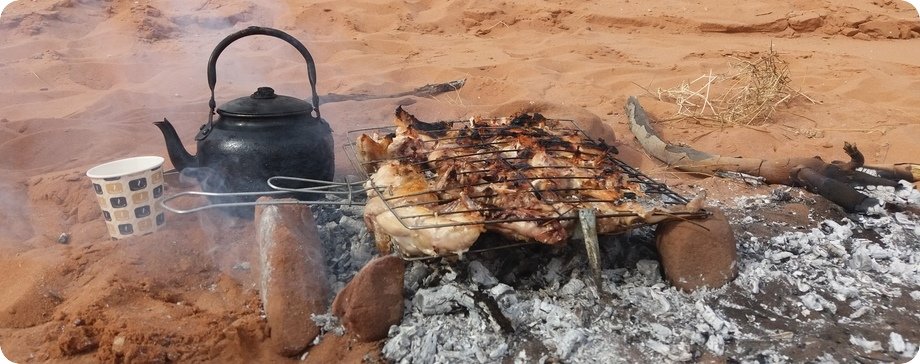
Bedouin's are very proud of their cuisine and are eager to share their local specialties with their guests. Below, we've written about a few of the foods you are likely to encounter when you visit us in Wadi Rum.
Bedouin Tea
Your first introduction to Bedouin cuisine will almost certainly be Bedouin tea. The tea is a made from a unique blend of plants found out in the desert. Typically served in a small glass cup, the tea can be surprisingly sweet. Although it will certainly be served in all of the tourist camps, the tea isn't just for tourists. As you tour around the desert you are likely to see many groups of Bedouins sitting together, all enjoying one, or many, cups of tea.
Bedouin Bread
Almost all meals in Wadi Rum will feature fresh Bedouin bread. This is a simple, circular flatbread that is eaten with all meals of the day. You will see that Bedouin bread is not just used to fill your stomach, but also as a sort of cutlery as Bedouin meals rarely feature knives, forks, or spoons.
Zarb
Zarb is a type of Bedouin barbecue and a local delicacy. Zarb typically involves a meat, such as chicken, and a variety of vegetables including potatoes, carrots, and zucchini. What makes zarb special is that the barbecue is located underground, in a large pit. The meats and vegetables are placed on a rack which is lowered below ground overtop hot coals. The pit is covered with sand until the zarb is finished. Zarb is a must-try dish when visiting Wadi Rum.
Mansaf
Mansaf is the national dish of Jordan and is a popular dish in many parts of the Middle East. The name 'mansaf' means 'large tray' which is how the dish is served. The large tray contains a large bed of rice topped with meat and sometimes vegetables. Mansaf is usually topped with lamb, however the use of different meats is not uncommon. Bedouins eat mansaf either with their hands or with tasty Bedouin bread.





